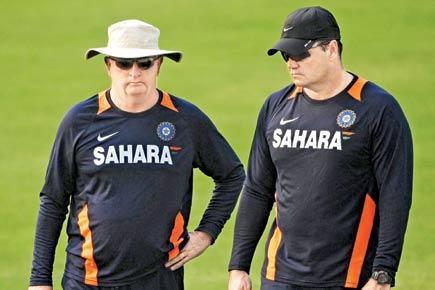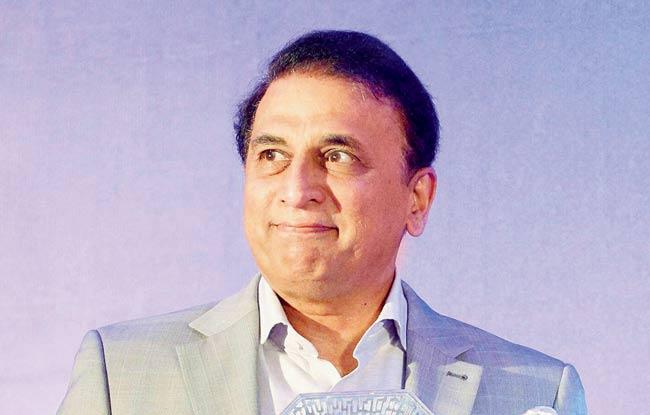It seems odd that Indian, Pakistani and Sri Lankan cricket establishments constantly prefer to use foreign experts in key roles rather than draw on their vast and experienced alumni

Indiau00c3u0083u00c2u00a2u00c3u0082u00c2u0080u00c3u0082u00c2u0099s head coach Duncan Fletcher (left) with bowling coach Joe Dawes Pic/AFP.
 Brisbane: So what’s the problem with local talent? When it comes to coaches, why is it that most of the Asian countries (and the West Indies to some extent) don’t believe in the expertise of their own countrymen? Is it because they know that the cricketers themselves don’t respect local authority or is it still a colonial hangover that refuses to dispense with the notion that ‘the firang’ the foreigner, is necessarily more qualified to do the job? Sport remains the last bastion of this cultural cringe that still refuses to shed the cloak of colonial deference. Is there a valid reason for this or is it a subconscious inferiority complex?
Brisbane: So what’s the problem with local talent? When it comes to coaches, why is it that most of the Asian countries (and the West Indies to some extent) don’t believe in the expertise of their own countrymen? Is it because they know that the cricketers themselves don’t respect local authority or is it still a colonial hangover that refuses to dispense with the notion that ‘the firang’ the foreigner, is necessarily more qualified to do the job? Sport remains the last bastion of this cultural cringe that still refuses to shed the cloak of colonial deference. Is there a valid reason for this or is it a subconscious inferiority complex?
ADVERTISEMENT
Consider the senior cricket coaching and support staff for most of the non-white cricket nations and you’ll see what I mean. When was the last time a local coach, doctor or physiotherapist was employed for any length of time? More to the point, why not? Is it a genuine lack of knowledge and experience? Is it because the foreign coach commands more respect? If so, why is that the case?

India’s head coach Duncan Fletcher (left) with bowling coach Joe Dawes Pic/AFP.
Understandable
Bangladesh may be forgiven – in cricketing terms, they are relatively young so they may justifiably believe that their coaches and support staff haven’t been around long enough to learn world’s best practice. But for India, Pakistan and Sri Lanka, it seems odd that they constantly prefer to use foreign experts in key roles rather than draw on their vast and (now) experienced alumni. How many world-class cricketers have they produced in the last thirty years? And yet, none of them are capable of running the national team? They still prefer a disparate crew of Australians, Zimbabweans, New Zealanders and South Africans, some of them with modest cricketing backgrounds themselves, to the local person who has played the game on home pitches, can speak the various local languages, better understands the subtle cultural influences, does not necessarily require relocation expenses and expensive hotel accommodation and appreciates the pressures that the media and fans exert on their cricketing heroes?

Sunil Gavaskar
When it comes to just about any other sphere of influence, the numbers tell a different story. South Asian professionals are massively over-represented throughout the world in the most prestigious industries like medicine, science, law, engineering, IT and business. Clearly, people from this part of the world are highly regarded for their skills, underpinned by the massive premium placed on higher education.
So it is probably safe to assume that it has nothing to do with a cultural propensity for mediocrity. You only need to scan the professional registers in countries like England, Australia, USA and New Zealand to see the disproportionate number of people with South Asian heritage occupying senior positions. And what’s more, they are respected and revered in these professions.
Falling short
Why then is cricket lagging behind in employing their own countrymen (and women) to senior coaching and support staff roles? For any number of reasons, it would make sense to assume that local knowledge would be vastly superior (or no worse) than employing a foreigner who may not even be expert in the basic skills associated with playing on local pitches, leaving aside the cultural, religious and language issues that make it even more difficult to adapt.
How come a country like India, the beating heart of cricket, can’t produce suitably qualified coaches/medicos/analysts who could easily do the job? In years to come, surely the likes of Tendulkar, Ganguly, Dravid, Kumble, Laxman, Sehwag, Srinath, Dhoni and others with their pedigree should be more qualified to coach India than someone from another country, even if they have played international cricket to a modest level? Pakistan, Sri Lanka and the West Indies could come up with similar lists of luminaries. So what’s the problem?
Is it still down to the perception that the Asian cricketer himself respects foreign authority, however mediocre, more than even a local legend? If so, how long before cricket catches up with the rest of the world and recognises that the best person for the job isn’t necessarily the one with a foreign passport? Why is it that we still think that Australian coaches for example are automatically better qualified than Indians? If you look through the IPL teams, a tournament based predominantly in India, presumably biased towards familiarity with Indian conditions (pitches, food, language, culture), stunningly, only one of eight coaches is Indian. These foreign coaches know more about how to play on Indian pitches? The Indian coaches are less skilled at analysing opposition strengths and weaknesses? Strategy is not something that Indians are famous for? Are there no Indians with sufficient experience and expertise who will be respected by the multi-national squads? If that was so, how come Silicon Valley (amongst other global centres of business) is so heavily dominated by geniuses from this region?
I can’t see Australia signing an Indian coach anytime soon. In fact, Australia’s brief dalliance with a foreign coach (Mickey Arthur) ended in tears, with the general consensus that Australian teams should be coached by an Australian. And yet, Australian coaches cheerfully apply for lucrative overseas postings.
The IPL coaching roster certainly suggests that foreign coaches are much more likely to make a handsome living in India than the Indians. Only one IPL team is coached by an Indian, for a tournament ostensibly played on Indian pitches.
So similar
The Caribbean T20 league is similarly skewed in favour of foreigners. The reverse doesn’t apply though – just look at Australia’s Big Bash and domestic T20 tournaments in England, NZ and South Africa; it is clear that they don’t have the same liberal employment outlook for coaches who are not from the so-called Western coaching systems.
At least India have wised up in the boardroom. The appointment of Sunil Gavaskar as interim chief of the BCCI hails a new dawn. Whatever problems are inherent within the BCCI, it needs a local person with intimate knowledge of local politics to sort out. They don’t come any more respected than Gavaskar. In his playing career, his courage and skill were undoubted by anyone that truly understands the significance of his runs and leadership as an opening batsman in an era of limited protective gear where frighteningly fast bowlers stalked the plains with murderous intent.
One can only hope that his legacy will not just leave an indelible mark on the administration but over time, his proud leadership will, at the very least, ask questions about why the system is so heavily biased against locals. The answers may not be at all sinister – the truth may just be that local coaches do not yet possess the expertise or knowledge to compete with foreigners. Hard as that is to believe from a nation that produces some of the smartest people on the planet, if it is true, perhaps Gavaskar’s leadership may signal the advent of a cultural shift that doesn’t always need to look to distant shores for hidden treasure.
2000: The year in which the BCCI decided to have a foreigner to coach the team after Kapil Dev failed as coach on the 1999-2000 tour of Australia
Michael Jeh writes a fortnightly column for this newspaper
 Subscribe today by clicking the link and stay updated with the latest news!" Click here!
Subscribe today by clicking the link and stay updated with the latest news!" Click here!






